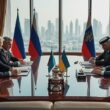Economic Advisers’ Chair, Monika Schnitzer, and Nuremberg Economist Enzo Weber urge a consistent economic policy to be focused on transformation. German industry is facing the greatest post-war challenge with China’s and the US’s strength in automotive and AI technology, the economists write in a guest article for “Spiegel”. Instead of just preserving the old, the state and companies should decisively set their sights on renewal.
In the future, the economy will be decarbonized and AI-driven, Schnitzer and Weber predict. “Both require our economy to be completely reinvented. But that’s not the way it looks now.”
Transformation means that established areas will inevitably come under pressure, while new opportunities will emerge, the economic researchers say. Alarming is that investments have been declining for years, few new industrial businesses are being founded, and the announcement of new job openings is historically weak.
Instead of getting lost in a downward spiral, a transformation competition should be set in motion, the economists write. This would include a predictable economic policy that defines goals, systematically evaluates results, and is not hijacked by lobbying interests. “Only what has proven itself will be supported: the motto is not `picking winners`, but `letting losers go`.”
Concretely, Schnitzer and Weber demand “a fundamental decision for a priority on charging infrastructure and grid expansion”, a consistent competition principle for the expansion of renewable energy, and a planned reduction in old subsidies in proportion to the support of new technologies. The state should support innovative start-ups by leveraging private capital, providing public procurement impulses, and making data available for AI-based business models. As skilled workers are scarce, their existing competences should be targeted for development in emerging areas, rather than being completely retrained or “golden handshakes” distributed, the economists demand.





